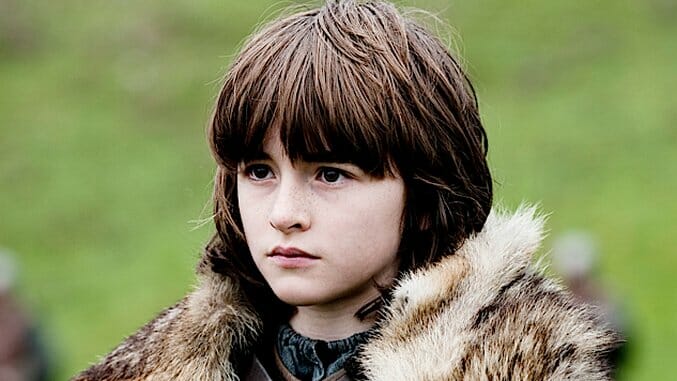The Game of Thrones Theory to End All Game of Thrones Theories

First off, let me warn you that this entire post is laced with lethal doses of spoilers, and they’re going to start dropping immediately. What follows this sentence is a fun .gif of the character Hot Pie, and if you don’t want any aspect of past, present, or future Game of Thrones ruined for you, do not go beyond Hot Pie.
WARNING: YOU HAVE PASSED HOT PIE. WE CAN NO LONGER GUARANTEE YOUR SAFETY OR SANITY. MINDS ARE AT GREAT RISK OF BEING BLOWN.
Okay, so before last night’s episode (gushing review here), we knew that Bran Stark could warg into animals and humans and control their actions. We also knew he could go back in time using his greenseer skills to observe past events. There was one vague hint in the Tower of Joy scene—when young Ned seemed to hear him calling out as he climbed the tower steps—that perhaps Bran could affect the past in some way, but the three-eyed raven quickly dismissed that notion, and that was that.
Then last night happened, and suddenly it seems that Bran can actually combine his two skills. While the cave of the three-eyed raven was being attacked by White Walkers, Bran was simultaneously greenseeing in Winterfell, years ago, observing young Hodor and young Ned Stark. That’s when he heard Meera’s voice calling to him from the cave, begging him to warg into Hodor. Bran was able to do that without leaving Winterfell, but he also (we think) warged into young Hodor. That changed the poor kid from a normal boy named Wylis into a simpleton who could only repeat a shortened version of the phrase “hold the door” for the rest of his life, in preparation for the moment at the cave when he would hold off the Wights and give Bran and Meera the crucial time they needed to escape.
It’s important to note that we still don’t know exactly what happened. Did Bran actually change the past and ruin Hodor’s life in order to ensure his safety in the future? Was there someone or something else influencing the outcomes? Or were these historical moments set in stone, as the three-eyed raven would have us believe, and we’re just witnessing the fluidity of time, where past, present and future have equal influence?
We’re going to ignore those questions for now, and accept that Bran was responsible for creating Hodor, and does indeed have the power to combine warging and greensight in order to change the past. If that’s true, then the entire scope of Game of Thrones just got blown the f*** up, and Bran became the most important character in the story—by far. Everything we’ve seen to this point can be called into question, and Bran’s potential influence on all past events is limitless. He might literally be the architect of an entire world—and I’m not using the word “architect” lightly, as you’ll see.
Let’s explore the possibilities of this theory, starting with the idea that first blew my mind last night:
The Voices in the Mad King’s Head Belong to Bran
I should mention that every idea I’m conveying comes from the geniuses at the Game of Thrones subreddit, which is a wonderful community that has enhanced my viewing/reading experience. In this thread, user Lycosnic points out that in one of the Season 6 trailers, we saw a scene that very much looked like Jaime Lannister killing Aerys Targaryen, the “Mad King,” in the moment that earned him the moniker “Kingslayer.” We already know that the only way we can see these past events is through Bran’s eyes—just like the Winterfell scene, and the Tower of Joy—so we can safely guess that Bran will be the vector by which we’re conveyed to the Iron Throne.
We also know that he and Meera are making a desperate escape attempt from the cave, heading for the south, and that if Bran does revisit the Mad King’s death, he could simultaneously be in the midst of a ferocious battle, at the Wall or elsewhere, against the White Walkers. I’ll let Lycosnic take it from here:
-

-

-

-

-

-

-

-

-

-

-

-

-

-

-

-

-

-

-

-

-

-

-

-

-

-

-

-

-

-

-

-

-

-

-

-

-

-

-

-










































